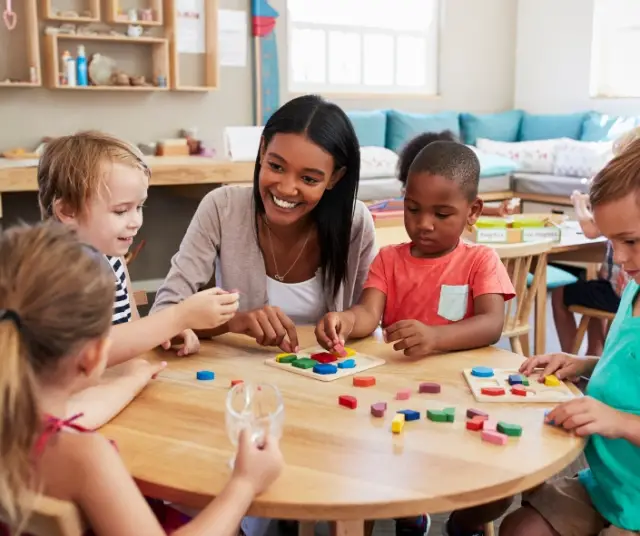The Montessori method is an educational approach based on the philosophy and pedagogy of Maria Montessori, an Italian physician and educator who developed this approach in the early 20th century. Since then, the Montessori method has spread throughout the world and has transformed the education of many generations of children.
Discover how you can transform the education of your children, you will learn about the fundamental principles of the method, the Montessori materials and how they are used in the classroom, as well as the benefits that this approach offers for children and their development.
The Montessori method is based on the idea that children are naturally curious and have an innate desire to learn. Montessori believed that children should be free to follow their own path of learning, guided by their interests and curiosities . To facilitate this approach, Montessori developed a set of fundamental principles that apply to all areas of Montessori education. These principles include:
- Prepared Environment: The environment must be carefully prepared to foster children's learning and development. The Montessori classroom is a clean, orderly and organized space, with carefully selected materials and arranged on shelves accessible to children.
- Freedom and discipline: Children should have the freedom to choose their own activities and work at their own pace, but they must also learn to respect the rules and limits set in the classroom.
- Activity and exploration: Children learn best through activity and exploration, not through direct instruction. Montessori materials are designed to be manipulated and explored by children, encouraging curiosity and discovery.
- Individualization: Children have different needs and learning rates. The Montessori method focuses on the individualization of learning, allowing each child to progress at their own pace and follow their own interests.
- Respect for the Child: Children are respected as capable and competent individuals and are treated with dignity and respect at all times.
Montessori materials and their use in the classroom
Montessori materials are an essential component of the method and are designed to encourage children's learning and development. These materials are often made from natural materials such as wood and metal, and are designed to be engaging and stimulating to children. Montessori materials are designed to be manipulated by children and encourage exploration and discovery. The materials are organized on shelves and are presented in an orderly and clear way so that children can choose and work with them independently.
Each Montessori material is designed to teach a specific skill, from hand-eye coordination to math comprehension and problem solving. Materials are progressive and presented sequentially, allowing children to progress at their own pace and follow their own interests. For example, Montessori materials for teaching mathematics include number blocks and number bars that help children understand basic quantity and number concepts. Geometry materials, such as shape blocks and puzzles, help children understand abstract concepts of shape and space. These language materials include movable letters that children can manipulate to build words and phrases. There are also materials to teach grammar , spelling , and reading comprehension.
In short, Montessori materials are designed to help children learn through exploration and manipulation. These materials foster independence, self-confidence, and a love of learning.
Benefits of the Montessori method
The Montessori method offers many benefits for children and their development. These benefits include:
- Promotes independence: Children learn to work independently and make decisions for themselves, which helps them develop independence and self-confidence.
- Promotes self-esteem: By working at their own pace and following their own interests, children feel more self-confident and have higher self-esteem.
- Develops Social Skills: Children in a Montessori classroom work in mixed age groups, which allows them to develop social skills and learn to interact with others.
- Encourages creativity: By allowing children to follow their own interests and work on their own activities, the Montessori method encourages creativity and imagination.
- Develops Cognitive Skills: Montessori materials are designed to teach key cognitive skills, such as problem solving, hand-eye coordination, and math comprehension.
- Promotes concentration: Children learn to focus on one activity for an extended period of time, which improves their ability to focus on other areas of life.
Is the Montessori method right for my child?
The Montessori method is suitable for most children, but it may not be suitable for everyone. It is important to remember that the Montessori method is a unique approach to education and that not all Montessori schools are the same. Before deciding if the Montessori method is right for your child, it is important to research and visit different Montessori schools. Talk to other parents, talk to teachers, and see how the method is used in the classroom. If you are considering a Montessori school, here are some questions you can ask to help you decide if it is right for your child:
- How is the Montessori method integrated into the school curriculum?
- How are Montessori activities and materials adapted to the different ages and abilities of children?
- How is creativity and imagination encouraged in the Montessori classroom?
- How is social interaction and cooperation among children promoted in a Montessori environment?
- How are Montessori activities integrated with other academic areas, such as science and history?
- How are the needs of children who need a more structured teaching approach addressed?
- How is children's progress and learning assessed in a Montessori classroom?
- How are parents involved in the educational process and in the school community in general?
If you decide that the Montessori method is right for your child, it is important to find a school that suits you and your child's needs. Montessori schools vary in size, philosophy, and quality, so it's important to do your homework before making a decision.
